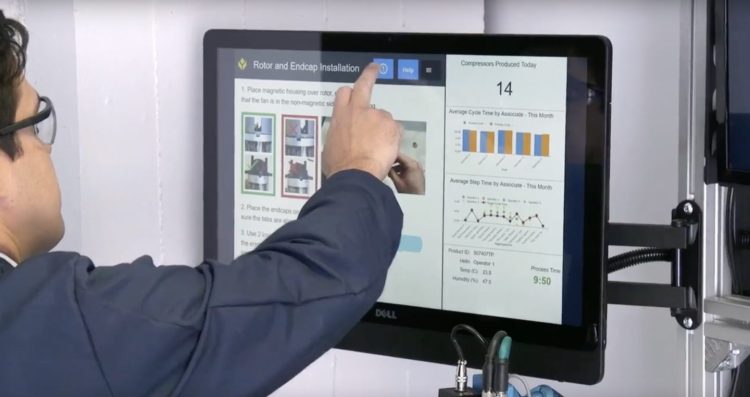Tulip, a software developer building a no-code app development platform tailored to manufacturers, today revealed that it has raised $39.5 million in a series B round led by DMG MORI, with participation from Vertex Ventures, NEA, and Pitango. The fresh capital brings the company’s total raised to over $70 million, following an $18.4 million series B round in February 2019 and a $13 million series A round in January 2017. CEO Natan Linder said it will fuel Tulip’s growth in the small and medium-sized enterprises (SME) market and in Europe, the Middle East, Africa, and Japan.
“We could not have asked for a better partner [than DMG MORI],” said Linder, who added that Tulip plans to open an office in Munich in the coming months. “While Tulip is already working with many of the largest global manufacturers, the machining SME market has always been core for us. DMG MORI and Tulip will be able to together offer software that has never before been available for SMEs. With [our] manufacturing app platform and our new no-code machine-monitoring capabilities, machining customers will be able to significantly improve productivity.”
Somerville, Massachusetts-based Tulip was cofounded in 2014 by Linder, who previously worked at the MIT Media Lab as a research assistant, and fellow Media Lab research affiliate and postdoctoral associate Rony Kubat. The two envisioned a full-stack solution that would enable manufacturing customers to build apps connecting to factory floor sensors and would ingest and transform this data without requiring users to learn any programming languages or database syntax.
To this end, Tulip’s drag-and-drop app creator ships with templates designed to address common shop floor issues, and it lets customers add images, videos, documents, and CAD files to brand and personalize their app experiences. The platform supports interactive forms that capture data through booleans, dropdown menus, checkboxes, text fields, and cameras, and it supports the integration of analytics tools that capture cycle time, defect rates, production yields, and other metrics about machines and equipment.
June 5th: The AI Audit in NYC
Join us next week in NYC to engage with top executive leaders, delving into strategies for auditing AI models to ensure fairness, optimal performance, and ethical compliance across diverse organizations. Secure your attendance for this exclusive invite-only event.

Tulip’s database editor seamlessly ties into existing third-party systems and directly connects with modern and legacy equipment, whether through industrial protocols or relay and analog signaling. It’s able to identify exactly which tools were used and at what time throughout a given process, and to impose granular role-based control over access to apps and workflows. Additionally, and perhaps more powerfully, Tulip can imbue apps with AI modules that can perform a range of identification, localization, and tracking tasks, including (but not limited to) activity classification, optical character recognition for serial numbers, gesture and motion recognition, and automatic marker detection.
Tulip maintains an audit trail to expose each and every change to apps, and it can roll back or restore previous app versions as required. Moreover, it boasts a built-in approval dashboard that enables users to design the processes by which changes are introduced into apps and to roll out updates to workstations as soon as they hit the production phase. Team members can even leave and receive comments from within a dynamic activity feed.
Tulip is not strictly a software platform. The startup’s complementary hardware includes an I/O gateway, which funnels data from devices, machines, and sensors to a central server, and Tulip’s Smart Workstation, which is built to order and comes retrofitted with sensors and equipment necessary for shop floor work. There’s also the light kit, a flexible light guide system that enables pick-to-light, place-to-light, and other applications.
Tulip plans start at $95 per month for two development stations and two interactive dashboard stations. The $195 Professional tier — a slot below the variably priced Enterprise plan — bumps that limit up to three development stations and three dashboards and throws in features like shift scheduling, approval workflows, active directory, and single sign-on.
“We are proud of our new alliance. After all, digitization is human-centered. With the no-code platform, employees can autonomously create manufacturing apps,” said Christian Thönes, executive board chair of DMG MORI digitization. “Tulip is the ideal entry into digitization, mainly for our medium-sized customers.”
Tulip counts among its customers Siemens, Dentsply Sirona, Jabil, Schneider Electric, Toyota, Bae Systems, and others across aerospace and defense, automotive, electronics, food and beverage, and pharmaceutical segments. In the case of Deloitte and Jabil, Tulip says its platform increased production yield and decreased manual assembly quality issues by 10% and 60%, respectively, in the first few weeks of operation.

